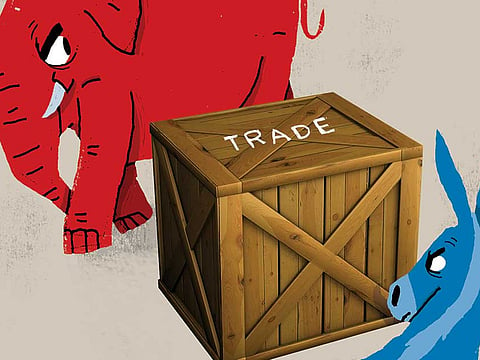US campaign rhetoric can have long term consequences
Diatribes against trade pacts and on banking and health care are worrying

There is a view among cynical Washington DC insiders that this year’s election won’t change much for the US economy, as most likely Congress will stay divided, and legislation gridlocked, regardless of who ends up in the White House.
However, the campaign has revealed significant ideological shifts beneath the surface. Basic assumptions about US economic policy have been upset, and the political debates could have long-lasting consequences, and profound global implications.
Three themes have shaped US economic history over the past 200 years — free trade, corporate power and the dollar — and are likely to continue to dominate the policy agenda in the next few years.
But the uninterrupted widening of income inequality in the US over the past 40 years has taken its toll, as has the long-lasting impact of the sub-prime mortgage crisis and the global financial crisis on US living standards and sentiment.
Thus, there has been a marked shift in how trade, big corporates and the currency have been debated during the current presidential campaign.
The US has had a complicated relationship with free trade. The country’s economic development in the 19th century was characterised, initially, by elevated tariffs and trade protectionism, only for it to emerge as a global manufacturing superpower at the turn of the 20th century, overtaking Great Britain along the way.
Donald Trump’s protectionist stance brings to mind the infamous 1930 Smoot-Hawley tariff, imposed as the US sank into economic depression after the 1929 crash. This tariff aggravated the global downturn, and fuelled “trade wars” across the globe. The economic ripples at the time had serious geopolitical consequences.
Today, rising political animosity towards the Trans-Pacific Partnership (TPP) trade agreement, negotiated for years by the Obama administration, reflects deep cracks in the US stance towards global trade. Both presidential candidates are against the TPP, marking an important turning point in the US’ historical stance on free trade.
The fear of excessive corporate power is an important undercurrent of the presidential election campaign, across both parties. This echoes to some extent the late 1800s, the ‘Gilded Age’, when focus was on the powerful railroad companies.
Today, the lightning rods are banking and health care. Both parties’ bases are calling for the reinstatement of the Glass-Steagall Act of 1930, which mandated the separation of deposit-taking activities from investment banks.
Both presidential candidates have suggested overhauling drug pricing. This would be a continuation of the increasingly interventionist approach taken by the Obama administration, which has blocked several prominent corporate mergers in the health care industry.
Similar political anger has been directed at the recent wave of ‘corporate inversions’, where companies move their legal domiciles to other countries for tax reasons. This debate has put a spotlight on antiquated US rules on global taxation. If anything gets done in Congress in the next four years, corporate tax reform is highest on the list, in our view.
We think a one-off tax on current corporate cash left abroad and restrictions on interest deductibility are possible; these measures may be justified as an easy way to fund more domestic infrastructure programmes. Whether the tech sector is also caught in the political crosshairs in the coming years, joining banking and health care, will be key to watch. The Democrats’ left wing is increasingly agitating for scrutiny of Silicon Valley.
The currency theme concerns not only the value of the US dollar, but also broader monetary and credit conditions. US economic history has been marked, alternatively, by loose and tight credit.
Today, there are surprising parallels between those calling for a return to the gold standard (mostly in the Republican camp) and those worried that Federal Reserve (Fed) monetary policy may fuel another debt bubble and financial crisis (mostly among the Democrats).
They share a high degree of uncertainty about current monetary policy. Some see the Fed’s quantitative easing programme and its elevated balance sheet as a worrying leap into the unknown. The Fed has actively stepped in to complement what it considers deficient fiscal policy, which has put the institution in the spotlight — and on politicians’ radar.
Trump has boasted that he is the “king of debt” and Clinton shows limited focus on reversing the sharp increase in government debt under Obama. Implicitly, both candidates’ proposed economic programmes rely heavily on the Fed keeping rates low for a prolonged period.
They also assume continued private sector re-leveraging to lengthen the business cycle. However, this reliance on debt may mask the persistent challenges of slowing productivity growth and deteriorating demographics.
Whatever the outcome of the US presidential election, with both the Republican and Democratic camps questioning centuries-long US economic policy, their stance on free trade, corporate power and the US dollar is likely to have far-reaching implications for the rest of the world.
The writer is Senior Economist — US at Standard Chartered.


